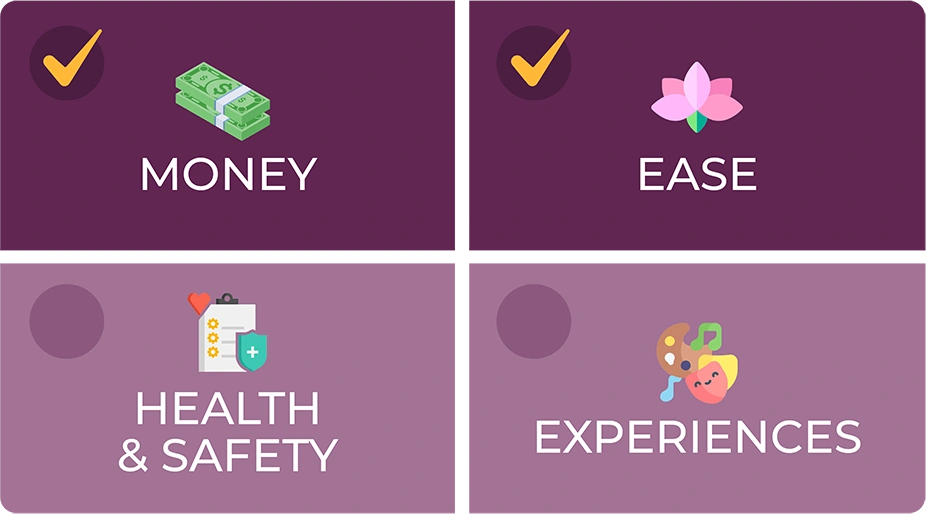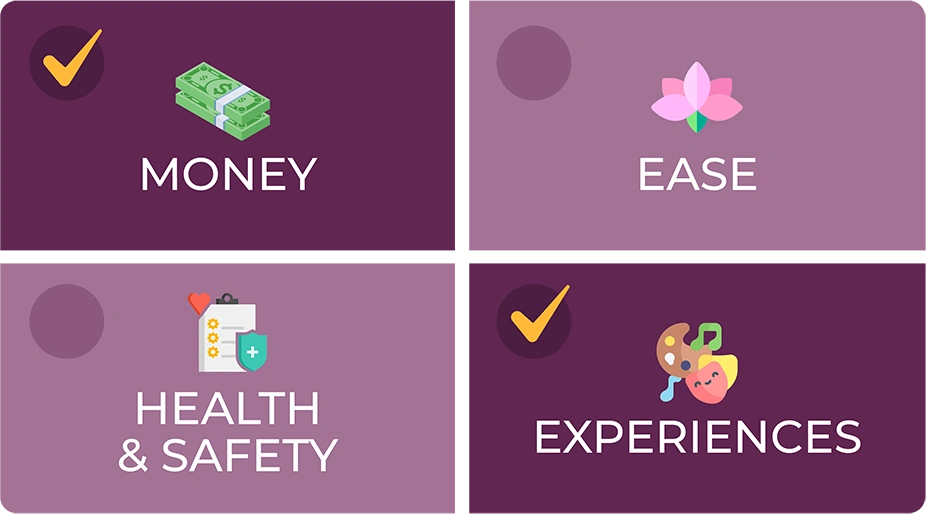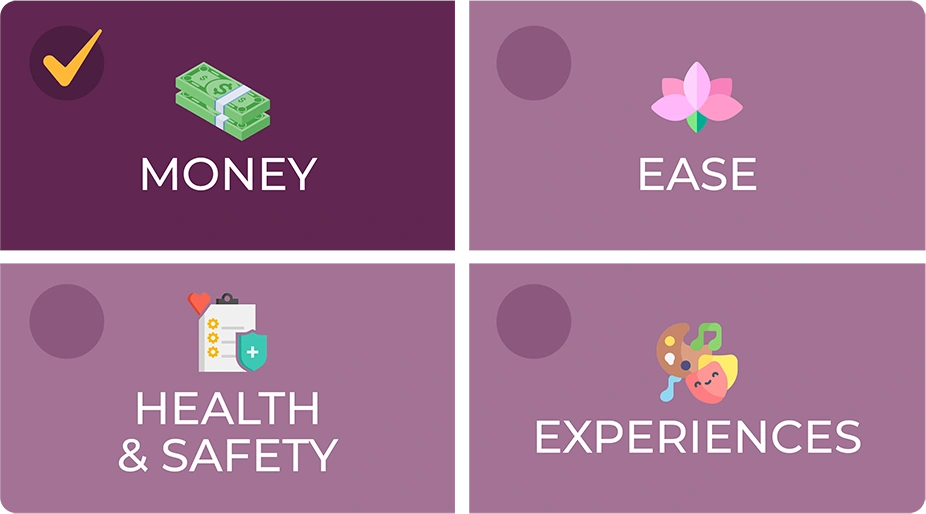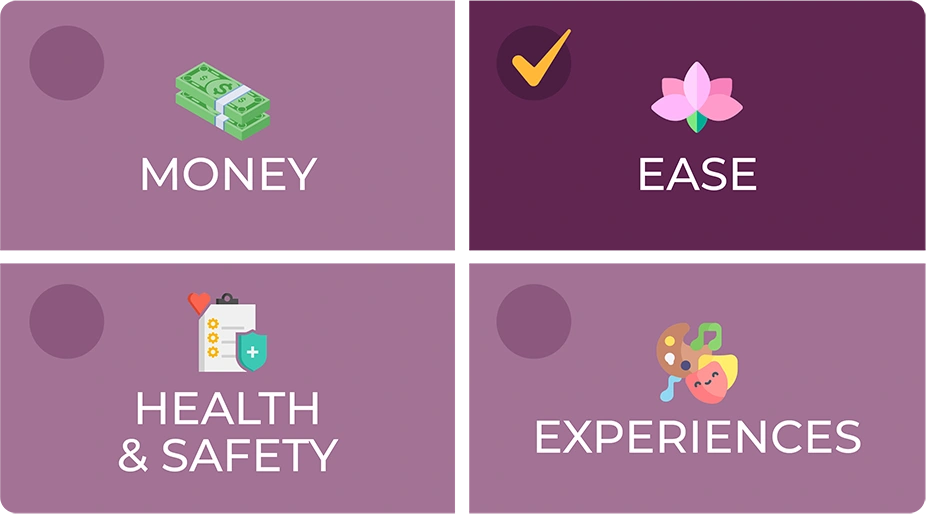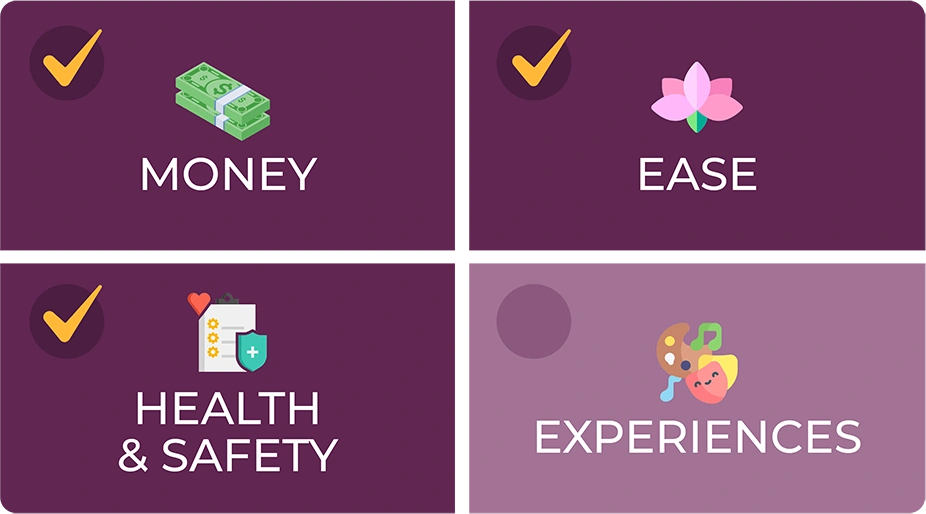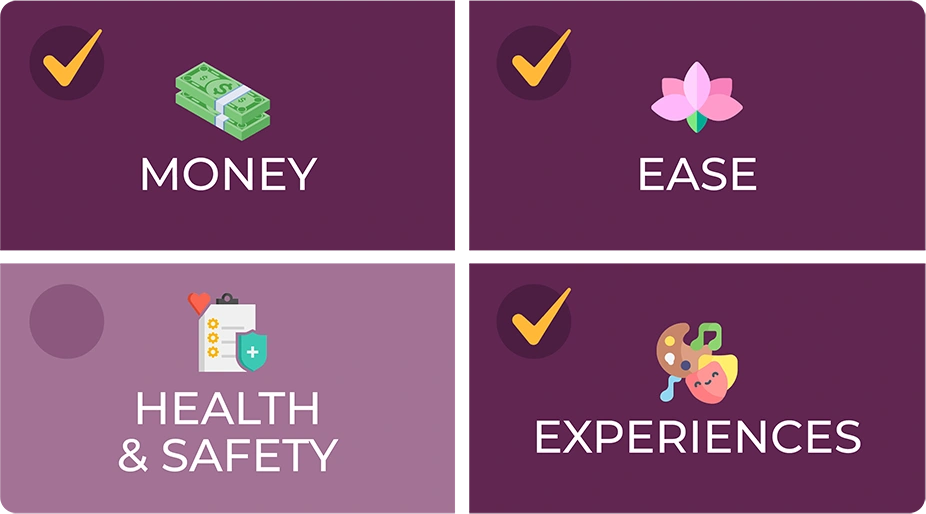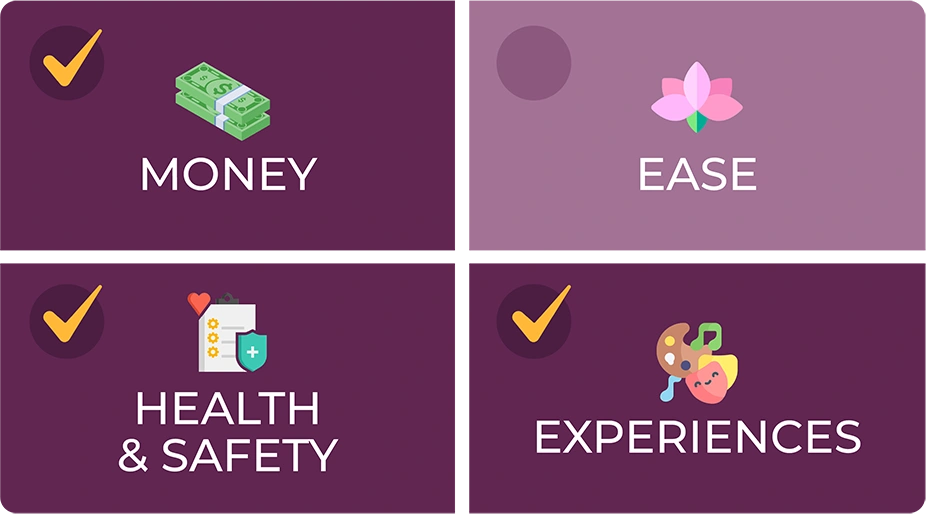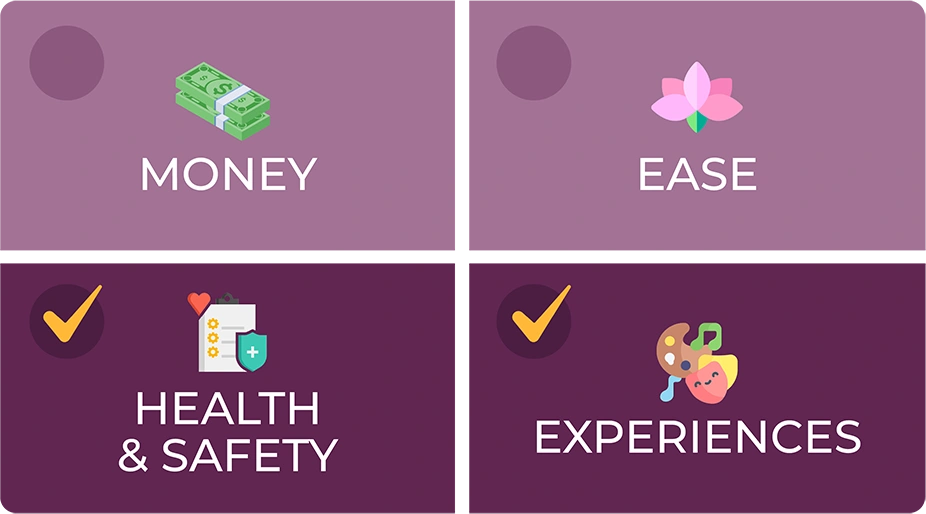You might call it a travel bucket list. Maybe you’re setting New Year’s resolutions. Or you could just be looking forward to whatever comes next.
The beautiful thing about a new year is that life feels full of fresh opportunities. If your wish list includes travel, Seven Corners can help you get ready.
As we plan our 2025 vacations, most of us are focusing on four things: saving money, maximizing convenience, staying safe, and getting a full experience.
Here are some of our favorite 2025 vacation hacks and ideas for planning another year full of adventures.
1. Book a 2025 Vacation Package.
One of the main reasons that people lean into vacation packages is because of their simplicity. Most, if not all, of your travel arrangements are completed with a single purchase.
Attraction tickets are booked, hotels are reserved, and flights might even be included. There’s minimal planning on your part, making this as close to a grab-and-go getaway as possible.
Use a travel agent to book your package and it’s even easier. They’re the ones doing all the research and legwork. They know the ins and outs of your destination and can make recommendations so that you get exactly what you want.
There is a bit of a tradeoff when you work with an agent. They may have a fee, which increases the cost of your travel, but they might also have the inside scoop on 2025 vacation deals. Even if they don’t secure you a “secret” deal, many travelers believe that the extra expense is still worth it because it makes life that much easier.
Read More >> How to Save Money with Family Vacation Packages
2. Sign Up for Loyalty and Rewards Programs.
Travel rewards and loyalty programs aren’t new. Hotel chains give you points based on how often you stay with them, credit cards reward you with perks as you make purchases. Rack up enough points and rewards, and you can cash them in for discounted or free travel.
Besides saving money, one of the upsides of these reward programs is access to exclusive or luxury travel. Your membership in a program might get you into an airport lounge. Or, like American Express, your reward could be an experience in and of itself. Members sometime get VIP access at sporting events, concerts and shows, and more.
When having a one-of-a-kind experience is important to you, consider these benefits when deciding which program to join. You might enjoy the elite access perks even more than cash rewards.
Downsides of travel rewards programs
There are a few things to be aware of if you want to truly save money with travel rewards programs, though. Some of these programs and credit cards have annual fees. If you don’t travel enough to offset the cost, or if you don’t pay your bill in full each month, the interest winds up being more than the savings you earn when you travel.
Also, cashing in those rewards can sometimes feel like a full-time job. Between figuring out blackout dates, what kind of airfare you’re actually eligible for, and keeping an elaborate spreadsheet to track how you earn with each of your 37 loyalty programs just to find the best deal, it can be a lot of work.
Research the requirements of each program so you know what you’re signing up for and whether it truly makes sense for you. And if using your travel rewards feels too complicated to be worth it, look for other ways to cut costs.
Read More >> Best Annual Subscriptions for Frequent Travelers
3. Take Advantage of Frequent Flyer Miles.
Air miles are great. Accumulate enough and you can get discounts on your airfare or cheaper upgrades. The airline might also give you extra perks like not having to pay for checked luggage.
Like loyalty and rewards programs, do your research before signing up for a frequent flyer program. Some airlines have better “exchange rates” and flight options than others. For example, Southwest tends to have one of the better frequent flyer programs, but if you don’t live near one of their hubs, it might not be worth it.
Also pay attention to how you earn miles. Some airlines are more restrictive, perhaps not even awarding miles on economy airfares, while others give you more chance. Delta, for example, has partnerships with Starbucks and Lyft that earn you air miles on coffee and ride purchases.
Read More >> How to Leverage Frequent Flyer Miles in 2025
4. Research Company Reputation.
There are steps you can take to reduce the headaches that sometimes come with travel and to boost that convenience factor.
If you’re flying, look at airlines’ track records for getting people to their destination on time. Flightaware has a report that shows how many flights an airline has cancelled in the last week. It might be worth it to pay extra to fly with a more reliable carrier.
Similarly, consider the reputation of a hotel or resort, tour organizers, cruise lines, or whoever else you book with.
If you have to update your reservation, do they have a reputation for good customer service so that you can make the necessary changes easily? Maybe you have dietary restrictions or food allergies, and you need the cruise line to make accommodations. Or you might just have a simple question. It’s never fun to get stuck on hold forever or not be able to talk to a real person.
To get a feel for what to expect from a company, read customer reviews (but also remember that most people who leave reviews are angry, so they might be a bit skewed). You should be able to get a general idea of whether that’s who you want to spend your money with.
Read More >> 7 Ways to Score the Best Flight Deals
5. Register for TSA PreCheck.
Is there anything more disappointing than missing a flight because you were still in a long security line? You were so close! Get TSA PreCheck for next time.
According to TSA, 93% of passengers with TSA PreCheck only spend about five minutes waiting in line at a security checkpoint. Yes, the membership comes with a fee, but it lasts for five years and can save massive amounts of time waiting.
If you have TSA PreCheck and you're flying with your kids on the same booking, they can get the TSA PreCheck designation on their boarding pass, too. Now no one has to wrestle in and out of their shoes at security.
Read More >> Tips for Flying with Kids (From a Flight Attendant)
6. Go on a Cruise.
It seems like everyone is booking a cruise these days. Why? They’re easy to plan and, when you consider what you get, people feel like they get good value for their money.
Coming out of the pandemic, most travelers turned to all-inclusive resorts. Prices had dropped to encourage people to come back. But as demand rebounded, those resorts increased their prices again. If you’re looking for the all-inclusive treatment for less money, a cruise could be it.
When comparing prices and deciding which ship to sail with, pay special attention to what’s included and what are additional expenses. To keep costs down, skip the drink packages and specialty restaurants, and be selective about which shore excursions you want to take.
Even if you aren’t worried about the price tag, you might love the simplicity of a cruise. On a recent trip to the Bahamas, I asked people who sail often why they like cruises so much. Almost everyone said it was because they got to visit multiple destinations without having to constantly pack and unpack their suitcase.
Lastly, you might be wondering why cruises got a checkmark for “Health & Safety.” This is primarily for the sense of security that families have while on board. Parents with teens and older kids tend to feel more comfortable granting them some independence; it’s not like setting them loose in a strange city.
If you want to give your kids some freedom but with guardrails for your own peace of mind, a cruise might be a good fit.
Read More >> The Best Cruises for Families, Singles, Couples, and More
7. Find the Right Lodging.
There are countless places to stay on vacation: hotels, vacation rental homes, glamping tents, primitive mountain cabins, your friend’s couch. No matter your budget or what you’re looking for, you should be able to find something that fits your needs.
All-inclusive resorts can make vacations super simple. There isn’t much easier than showing up knowing you have incredible sleeping accommodations, delicious restaurants, and stunning pools or other activities, all rolled into one neat package.
You can sometimes find great deals on all-inclusive resorts, but don’t be surprised if you end up paying for the luxury and convenience somewhere along the way. Be on the lookout for hidden resort fees.
To save money, booking a moderate hotel is probably your best bet, especially if you have loyalty rewards points or discounts as a AAA member or veteran. Three- and four-star hotels can offer plenty of luxury for a reasonable amount of money.
If you’re traveling with a group or a large family, though, you might opt for a rental house. Splitting the cost of a vacation home often comes out to less money per person and may be cheaper than booking multiple rooms at a hotel instead.
We also love what Airbnb offers in the way of local experiences. In some major cities, you can book classes or outings as part of your rental to get a more authentic feel for your destination. Add that to the fact that some rentals are located outside of the main tourist zones, and you might find it easier to immerse yourself in the culture than if you were to stay at a hotel.
If the experience you’re looking for is more about quirkiness rather than culture, keep an eye out for retro roadside motels, unique lodging like yurts, or other unusual sites.
Read More >> How to Pick the Perfect Place to Stay on Vacation
8. Keep Your Plans Flexible.
We know that sometimes you have to travel at a specific time. The date and location of your cousin’s wedding is what it is. But if you can, be flexible and you just might reap the rewards.
Start with where and when you go. Let’s say I want to go to Vermont in early October. A flight from my home base in Indianapolis costs about $1,200.
However, I could be more flexible and say I want to go anywhere fun in the fall. Suddenly, I have the freedom to choose the time and place that is most economical and still enjoy my trip.
Visiting Vermont in the fall would be beautiful — all those leaves! — but I could enjoy a trip to Charleston, South Carolina, in November just as much. And it would cost me less money. It just requires a shift to a more flexible mindset.
Try a site like Kayak with its Explore option where you pick your starting point and then compare a variety of destinations and dates without limiting yourself too much.
You can take the same flexible approach excursions. Maybe you don’t book any specific activities until you get there and see where the deals are. Perhaps a tour will have a last-minute cancellation that lets you join at a discounted price, or you find a coupon at a rest stop along the way.
Staying flexible lets you take advantage of these spontaneous — and inexpensive — moments.
Travel insurance with CFAR for flexibility
We’ll get more into travel insurance in a bit, but we’d be shortchanging you if we didn’t mention here how trip protection can help you be more flexible and, therefore, smarter with your money.
Cancel for Any Reason (CFAR) coverage is an optional benefit that adds a layer of flexibility to your travel insurance that you wouldn’t otherwise have. As we’ll mention below, travel insurance benefits only protect you for certain covered reasons. With a standard trip protection plan, if you need to cancel your trip, it must be for a covered reason in order to be reimbursed.
However, if you add CFAR, you can cancel your trip for any reason you wish and still be reimbursed for up to 75% of your prepaid, nonrefundable trip expenses.
Let’s go back to my example above. Because the price is so good, I've booked my trip to Charleston for October, even though it’s several months away. And because I know a lot of things can happen between now and then, I also decided to purchase travel insurance with CFAR.
If I get closer to my departure and realize that this isn’t the trip I want anymore — maybe I've simply changed my mind — I can receive a portion of my prepaid trip expenses back because of CFAR. My decision to add CFAR gave me the flexibility to book a trip and then change my mind without forfeiting my entire investment.
Read More >> What is Cancel for Any Reason Travel Insurance
9. Prioritize Your Wants.
When you’re trying to save money on vacation, step one is to determine your priorities. Once you know what’s most important to you — accommodations, proximity to major attractions, time with family, attending a particular event — it’s easier to decide where you’re going to invest your money.
For example, if your reason for travel is to spend quality time with your family, to disconnect from technology and be more present for great conversation, your money might be better invested in the ideal vacation rental home rather than a hotel near the top tourist attractions.
We don’t care how many great reviews the hotel has or whether it’s within walking distance of great restaurants. If it doesn’t fit your vacation goals, it’s not worth the money.
Take time to really decide why you want to travel, not because “this is what we’ve always done” or because some random “best of” list said you should. Plan your trip around your own goal. You won’t regret spending money on something you loved.
Read More >> How to Plan an Amazing Cheap Summer Vacation
10. Plan for the Unexpected.
We’ve seen more flight cancellations and delays, and more lost bags, in the last few years than ever before. Hurricanes, tech outages, and labor shortages seemed to hit left and right.
You might not know what is going to happen, but you can prepare so you know how to respond when it does.
- If your flight is cancelled, what rights do you have with the airline?
- What benefits will be covered by your travel insurance?
- If a travel company, like a tour operator or cruise line, offers a refund, will you get money back or do you get credits to use with the company in the future?
Understanding the fine print of what you purchased, whether that’s an airline ticket, a rental car agreement, or travel insurance, is key to minimizing the impact of a disruption. You improve your chances of getting any reimbursement you’re owed, you can work through the process of making changes to your trip or making a claim more easily when you already know what to expect, and you know who to turn to when you need help in an emergency.
You don’t want to be trying to figure any of that out in a moment of high stress.
Understanding travel insurance benefits
We know travel insurance can be complex, and one of the biggest points of confusion is meeting the triggers, or covered reasons, that make you eligible for reimbursement based on the terms of your plan.
When it comes to trip protection, know that you can only be reimbursed for situations that are covered by your plan. You need to be familiar with what those instances are and what is excluded so that you know if you could be reimbursed for an extra night in a hotel when your new flight doesn’t leave until the next day, or if you can get your money back for a prepaid excursion at your destination if you don’t arrive on time.
Here’s an example to make this clearer. Let’s say you’re returning home from a Caribbean vacation and your flight is delayed. In order to be reimbursed under the Trip Delay benefit, your flight must be delayed the length of time and for one of the covered reasons listed in your plan document.
So if your flight was for 8 p.m., but inclement weather — a common covered reason — delayed it until 6 a.m. the next morning, your travel insurance could cover the expense of the unexpected hotel stay. If, however, your original flight was delayed until only 9 p.m., any claim you might make may not be covered.
If this seems overwhelming, talk to a licensed travel insurance agent when you purchase your plan. They’ll be able to explain how the benefits work, review your plan document with you, and answer any questions.
Knowing what to do when your trip is disrupted — and how your travel insurance can help — goes a long way toward your peace of mind.
11. Don’t Rush Your Decisions.
If you’re a planner (not all of us have the guts for spontaneous getaways) then you want to give yourself plenty of time to cross all the T’s and dot all the I’s. Avoid making silly mistakes or regrettable decisions, and don’t hurry through your research.
Giving yourself time to plan means you can look for the best deals and not simply take the first thing you see or whatever’s left over.
Your research isn’t just about finding the cheapest prices, though. Consider value as much as price. How do you want to spend your money? Two hotels might have the same price, but they don’t necessarily have the same value.
Here's what we mean. Two hotels cost the same, but one looks cleaner while the other is within walking distance of an amusement park you’re going to. If you’re willing to trade a convenient location for bedsheets that don’t give you the heebie-jeebies, then the cleaner hotel is more valuable. Even if the convenient hotel were less expensive, you might still feel like you’re getting more bang for your buck at the cleaner one. That’s where you should invest your hard-earned dollars.
After you’ve weighed the value of a potential purchase, make sure the deal is as good as it seems. All too often, there are added fees and hidden expenses. Or, and we see this on Black Friday all the time, the so-called sale price isn’t actually a significant markdown. They label it a “sale” in hopes that you’ll put it in your shopping cart without thinking about it too much.
Companies will try to create a sense of urgency around a purchase so that you rush into a decision and spend more money than you need to. Don’t be afraid to hit pause and make sure you’re getting what you want.
A few more benefits about taking your time when you plan. First, that extra time lets you scout out the company or location. Check out their reputation, if it’s in a part of town you’ll feel comfortable walking around at night, whether they have a history of being welcoming to visitors. You won’t always be able to get quick answers, so don’t rush it.
Lastly, finding unique experiences doesn’t happen easily. Often, they’re “authentic” and “untouched” because they’ve been flying under the radar. You’re going to have to dig a little bit into the depths of the internet, maybe talk to some locals and be a real detective to find the one-of-a-kind experiences you crave.
12. Get the Travel Insurance.
Buying travel insurance really can help you have a better vacation. (You’re thinking, “Of course they’d say that.”) Hear us out.
There are different types of travel insurance, one of which is trip protection. This includes benefits such as trip cancellation, trip interruption, and trip delay, among others.
These benefits, when you meet the requirements outlined in your plan, can reimburse you when your trip doesn’t go as planned. That means that instead of losing money when something goes wrong, your nonrefundable trip expenses go back in your wallet.
Another type of travel insurance is travel medical insurance. This can pay for treatment if you get sick or hurt during your trip. Some of the most common medical claims we see are for appendicitis and broken bones. So while your travel medical insurance can cover catastrophic (and expensive) illness and injury, it can also take care of expenses related to more common ailments.
This is particularly helpful to you financially when you’re traveling outside of your domestic health insurance network or overseas where your everyday insurance doesn’t cover you. Instead of you having to pay for medical care out of pocket, your travel medical insurance can pick up the bill.
We’ve also checked the box for ease and convenience because of the travel assistance services that come with Seven Corners plans. Our Assist Team can help you find a doctor abroad, arrange emergency medical evacuations, and support you during any number of other travel emergencies.
Without this kind of support, you’d be left trying to navigate scary situations on your own, possibly in another language. What better way to add ease to your trip knowing that you have multilingual experts available 24/7 to help you in an emergency?
Between medical coverage and our Assist Team, you have a better chance of getting the kind of care you need, no matter where you travel. And that’s a good thing for your health and safety, no matter which way you look at it.
Read More >> Comparing Travel Insurance Plans: Which Is Right for Me?
13. Give Back with Voluntourism.
One of the best ways to get a rich travel experience is by volunteering at your destination. Voluntourism typically gives you an inside look at how people live, which is often very different from your own everyday existence. It can be an incredibly eye-opening and rewarding experience for everyone involved.
Voluntourism also tends to be a less expensive way to travel. You won’t find luxurious accommodations or meals, but the budget-friendly tradeoff is that your daily expenses will be low while you work to give back to the community to visit.
Read More >> How to Plan Responsible Volunteer Travel
14. Try Slow Travel.
Another option when you’re looking for so-called authentic travel experiences is to choose slow travel.
This isn’t necessarily about being a beach bum, although you could be. It’s about giving yourself permission to slow down enough that you can really take in the world around you.
When you aren’t destination hopping and cramming in stops at as many attractions as possible, you have the time to observe and be more aware of your surroundings, immersing yourself in your destination.
Choose your destination based on the experience you want. A traveler who wants to see a show every night and enjoy fine dining would probably be much happier going to New York City than New Berlin, Wisconsin (population: 40,000). Someone who wants to read a book before a relaxing walk on the beach would likely prefer South Manitou Island, Michigan, over Santa Catalina Island, California.
Slow travel has the upside of being budget-friendly in many cases. Because you tend to have a single home base, you spend less on transportation getting from one site to the next. You might be able to save money on food, one of our biggest vacation expenses, if you book lodging with a kitchenette where you can make your own snacks and the occasional simple meal.
And slow travel is easier to plan. There’s less to arrange, after all, given that you might arrive at your destination simply waiting to see where the wind takes you. Even if you create an itinerary before you leave, there shouldn’t be much on it, and you can focus on a few high-impact experiences.
Read More >> How to Slow Down & Get the Most Out of Travel
15. Take a Digital Detox Trip.
Going on an unplugged vacation has growing appeal. In a time where it’s easy to work from anywhere, we struggle more than ever to fully disconnect on vacation. That saps away some of the refreshing benefits of a trip.
To reclaim your peace and quiet on vacation, book a digital detox vacation. Find out what it’s like to not answer endless emails and text messages, and to not scroll mindlessly on social media that ends up just depressing you anyway.
Instead, be present with the people around you. Connect with your environment. Have a real and true experience, unfiltered and in the moment.
Read More >> Guide to Unplugging for a Technology-Free Vacation
16. Go on a Wellness Retreat.
Wellness travel can have different meanings for different people. And every wellness getaway could be structured in unique ways.
Examples of wellness travel include:
- Mindfulness retreats and spiritual practice that help us be more present, not only when we travel, but in our everyday lives
- Physical wellness retreats that can help you improve your fitness likes stamina and strength as well as sleep and eating habits
- Nature retreats that help us tap into the health benefits of time in the outdoors
- Special interest retreats that let you explore new creative outlets, develop a new skill, or simply spend time in the company of others with similar hobbies
Some of these trips, especially if you choose a wellness resort full of experts and gurus to help you on your journey, can get expensive. But sometimes you decide it’s time to invest in your health. A wellness trip might help you do that.
One of the advantages of working on your wellness goals in a new location is because you get away from the pressures and obligations of everyday life.
A little distance — literal and figurative — can help you focus on what matters. Maybe you need to remove yourself from the chatter of friends and family who think they know what’s best for you, and a wellness resort gives you the needed space to think and decide for yourself.
Experience something new and meaningful, just for you, with a wellness retreat.
Read More >> Guide to Wellness Retreats
17. Combine Business with Pleasure.
To save money and add convenience to your travels, try to combine a vacation with a business trip. Combining business with leisure — bleisure or workcations — can be a great way to have your employer pay for your transportation to and from your destination and to sneak in a little extra away time.
Start by finding out your employer’s policy on travel and what kind of flexibility you have when it comes to extending your trips.
In a previous job, I attended a three-day conference in California. After making sure my company would pay for my return flight if I came home via a different airport, I extended my trip by a week.
As someone who lived in Indiana, this was incredibly convenient. I was able to fly on company time and get reimbursed for a cross-country flight, even though most of my time away was actually spent visiting family.
Do your best to maintain balance on these trips. Work and play each have their time and place. Mixing the two often means you won’t accomplish either very well.
What days to take off in 2025 to maximize PTO
If you pair your vacation with scheduled holidays your company gives you anyway, you can often get an extended trip without burning all your PTO at once. Here’s what that might look like in 2025.
- New Year’s Day 2025 is on a Wednesday. If you take Jan. 2 and 3 as PTO, you get a five-day weekend using only two vacation days.
- Memorial Day falls on Monday, May 26, this year. Take off Friday, May 23, for a four-day weekend and only one day of PTO.
- Juneteenth is on Thursday, June 19. Taking the Friday after as PTO gives you an efficient four-day weekend.
- The Fourth of July is on a Friday. Claim a PTO day on the Thursday before or Monday after (or both!) to get an extended break.
- Ask your boss for Friday, Aug. 29, off and turn Labor Day (Monday, Sept. 1) into an extra-long weekend.
- Christmas 2025 is on a Thursday. If your company has a “use it or lose it” PTO policy and you still have some in the bank, here’s where you can take advantage. Take Monday, Dec. 22, through Wednesday, Dec. 24, plus Friday, Dec. 26, as PTO. That’s nine consecutive days off and you likely only used three or four vacation days.
Read More >> How to Avoid Distraction When You’re a Digital Nomad
The Best Travel Insurance for 2025
There’s no one way to plan a vacation. Every adventurer is unique, and you deserve the support to make the most of your trip, no matter where you go or how you travel.
That’s why Seven Corners offers customizable travel insurance plans. We’ll work with you to find the best coverage that meets your needs and your budgets. Our licensed agents and customer care team are ready to make sure you have the best trip possible.
Don’t forget to ask about our annual travel insurance plans, too. If you expect to take multiple trips this year, purchasing a single plan can cover you every time (a major check for ease and convenience!).
Get a quick quote online at SevenCorners.com or call our team before you hit the road in 2025.
